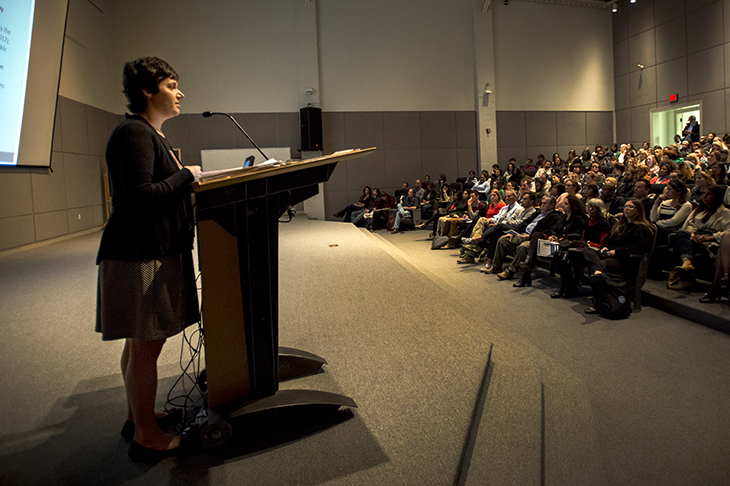Charter school market meets grassroots resistance

Kristen Buras, author of Charter Schools, Race, and Urban Space, speaks at Tulane University on Feb. 23 about the grand experiment of education reform taking place in New Orleans today. (Photo by Ryan Rivet)
In the wake of Hurricane Katrina, the Orleans Parish School Board fired 7,500 educators in a single day. A decade later, charter school advocates argue that New Orleans emerged from the grand experiment of education reform with the largest improvements ever seen in public schools. New Orleans" own Kristen Buras spoke at the Tulane University uptown campus on Monday (Feb. 23) to promote a very different perspective.
Buras, a Loyola University graduate who now teaches at Georgia State University, authored Charter Schools, Race and Urban Space: Where the Market Meets Resistance (Routledge, 2014). In this book, she argues that the teachers who lost both their jobs and homes in the crucible of Katrina were not at fault.
“If we want to understand the struggle that prevailed in the public schools in this city prior to Katrina, we need an adequate historical analysis of white supremacy,” said Buras, noting that the disenfranchisement of African-Americans did not end with the Civil Rights movement. Less than a month after the predominantly black teachers were fired, the city signed a contract with Teach for America, drawing non-local, inexperienced white teachers.
Education is now a success-based enterprise in New Orleans. However, Buras explained that just four Recovery School District charter schools topped the 2014 state average in test scores. While charter companies tout choice, the lottery system often fails to allot top selections, particularly for special needs students.
“This is not a story that is told from the perspective of elite policy makers,” said Buras. “It is told from the perspective of affected community members.” She dedicated her work to these very men, women and children.
“For our city,” she concluded, “our feet can"t fail us now.”
Buras" lecture was sponsored by African and African Diaspora studies and the political science and sociology departments at Tulane as well as the Scholars Strategy Network.
Jamie Logan is a sophomore majoring in English and classical studies with a minor in psychology.
